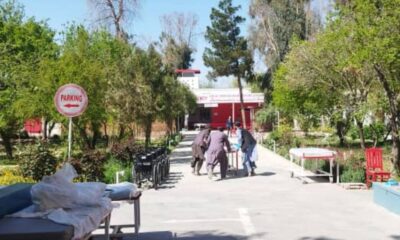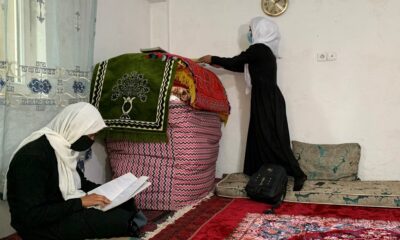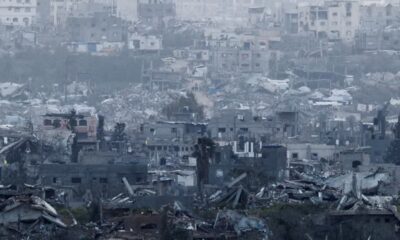World
Turkey faces election runoff, Erdogan seen with momentum
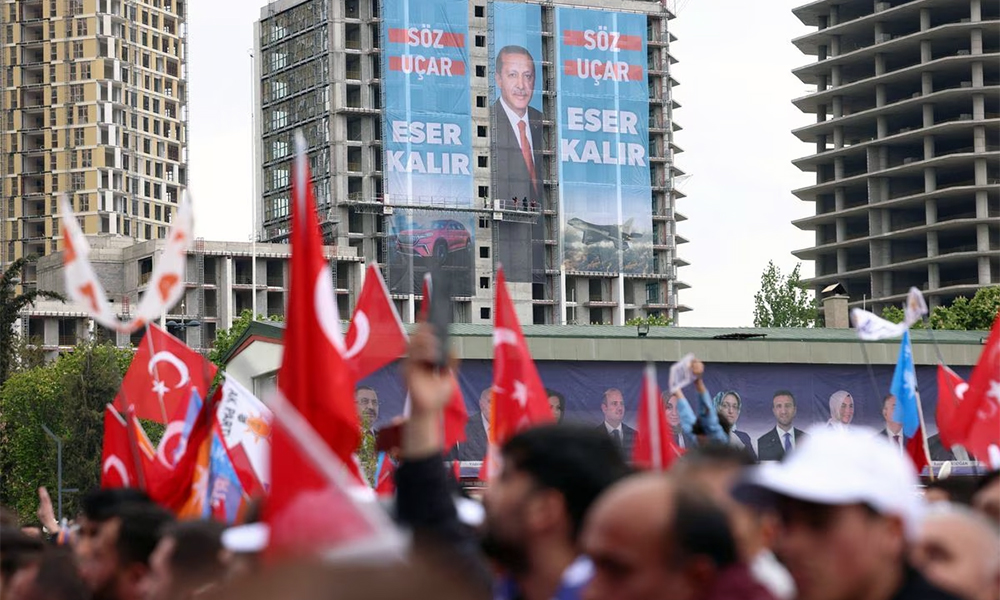
President Tayyip Erdogan led comfortably on Monday after the first round of Turkey’s presidential election, with his rival facing an uphill struggle to prevent the president extending his rule into a third decade in a runoff vote on May 28, Reuters reported.
Turkish assets weakened on the news, which showed Erdogan only just below the 50% threshold needed to avoid sending the NATO-member country to a second round of a presidential election viewed as passing judgment on his autocratic rule.
Erdogan’s People’s Alliance, comprising his Islamist-rooted AK Party and its nationalist partners, also appeared set to win a majority in Turkey’s new parliament with 321 of the 600 seats, further boosting his chances in the presidential runoff.
“The winner has undoubtedly been our country,” Erdogan said in a speech to cheering supporters at the AKP headquarters in the capital Ankara overnight.
With most votes counted in the presidential contest, Erdogan had 49.51% and his main opposition rival Kemal Kilicdaroglu 44.88%, High Election Board chairman Ahmet Yener told reporters. Turnout was a very high 88.8%, read the report.
Further boosting Erdogan’s prospects, nationalist candidate Sinan Ogan, who placed third in Sunday’s election, told Reuters in an interview he would only endorse Kilicdaroglu in the runoff if the latter ruled out any concessions to a pro-Kurdish party, parliament’s third largest.
That party, the HDP, backs Kilicdaroglu but is accused of ties to Kurdish militants, which it denies.
The 2.8 million voters who backed Ogan in the first round could prove crucial for Kilicdaroglu if he is to defeat Erdogan.
Opinion polls had shown Erdogan, 69, trailing Kilicdaroglu, but the outcome suggested that the president and his AK Party were able to rally conservative voters despite a cost-of-living crisis and soaring inflation, Reuters reported.
Kilicdaroglu, head of a six-party alliance, vowed to prevail in the runoff and accused Erdogan’s party of interfering with the counting and reporting of results. He called on his supporters to be patient, but they were downcast on Monday.
“We are sad, we are depressed about the whole situation. We expected different results,” said commuter Volkan Atilgan as he sat near a ferry station in Istanbul. “God willing, we will win this victory in the second round.”
By contrast, Erdogan supporters were jubilant as the results filtered out, with cyber security engineer Feyyaz Balcu, 23, confident that Erdogan could fix Turkey’s economic woes.
“It is very important for all Turkish people that Erdogan wins the elections. He is a world leader and all the Turks and Muslims want Erdogan as president,” he said.
The prospect of five more years of Erdogan’s rule will upset civil rights activists campaigning for reforms to undo the damage they say he has done to Turkey’s democracy. He says he respects democracy.
Thousands of political prisoners and activists could be released if the opposition prevails, Reuters reported.
Stocks fell, the lira was near a two-month low, sovereign dollar bonds fell and the cost of insuring exposure to Turkey’s debt spiked. Analysts voiced concern about the uncertainty and diminishing prospects of a return to economic policy orthodoxy.
“Erdogan has now a clear psychological lead against the opposition,” said Teneo co-president Wolfango Piccoli. “Erdogan will likely double down on his national security focused narratives over the next two weeks.”
The election has been closely watched in Europe, Washington, Moscow, and across the region, where Erdogan has asserted Turkish power while strengthening ties to Russia and putting strain on Ankara’s traditional alliance with the United States, Reuters reported.
Erdogan has cordial relations with President Vladimir Putin and his strong showing is likely to encourage the Kremlin but unnerve the Biden administration, as well as many European and leaders who had troubled ties with Erdogan.
White House spokesperson John Kirby said President Joe Biden was looking forward to working with whoever won the vote. The Kremlin said it expected Russia’s cooperation with Turkey to continue and deepen whoever wins.
Analysts saw Middle Eastern governments preferring continuity over change after Erdogan’s showing, regarding him as part of an acceptable status quo in a tumultuous region.
The opposition had expected to benefit from voter anger at economic woes after an unorthodox policy of low interest rates triggered a lira crisis and soaring inflation. A slow government response to earthquakes that killed 50,000 people in February had also been expected to influence voters.
Kilicdaroglu, 74, has pledged to revive democracy after years of state repression, return to orthodox economic policies, empower institutions that lost autonomy under Erdogan and rebuild frail ties with the West, read the report.
The political uncertainty is expected to weigh on financial markets over the next two weeks. The lira stood at 19.67 to the dollar at 1348 GMT, after reaching 19.70 in earlier trading, its weakest since a record low of 19.80 hit in March.
The cost of insuring against Turkey defaulting on its sovereign debts surged to a six-month high, jumping 105 basis points (bps) from Friday’s levels to 597 bps, according to S&P Global Market Intelligence, Reuters reported.
World
Trump signs order aimed at dismantling US Department of Education

Flanked by students and educators, U.S. President Donald Trump on Thursday signed an executive order intended to essentially dismantle the federal Department of Education, making good on a longstanding campaign promise to conservatives.
The order is designed to leave school policy almost entirely in the hands of states and local boards, a prospect that alarms liberal education advocates, Reuters reported.
Thursday’s order was a first step “to eliminate” the department, Trump said at a signing ceremony in the East Room of the White House. Shuttering the agency completely requires an act of Congress, and Trump lacks the votes for that.
“We’re going to be returning education, very simply, back to the states where it belongs,” said Trump in front of a colorful backdrop of state flags.
Young students invited to the event sat at classroom desks encircling the president and signed their own mock executive orders alongside him.
The signing followed the department’s announcement last week that it would lay off nearly half of its staff, in step with Trump’s sweeping efforts to reduce the size of a federal government he considers to be bloated and inefficient.
Education has long been a political lightning rod in the United States. Conservatives favor local control over education policy and school-choice options that help private and religious schools, and left-leaning voters largely support robust funding for public schools and diversity programs.
But Trump has elevated the fight to a different level, making it part of a generalized push against what conservatives view as liberal indoctrination in America’s schools from the university level down to K-12 instruction.
He has sought to re-engineer higher education in the United States by reducing funding and pushing to eliminate diversity, equity and inclusion policies at colleges and universities, just as he has in the federal government.
Columbia University, for example, faced a Thursday deadline to respond to demands to tighten restrictions on campus protests as preconditions for opening talks on restoring $400 million in suspended federal funding.
The White House also argues the Education Department is a waste of money, citing mediocre test scores, disappointing literacy rates and lax math skills among students as proof that the return on the agency’s trillions of dollars in investment was poor.
Local battles over K-12 curricula accelerated during the coronavirus pandemic, which saw parents angrily confront officials at school board meetings nationwide. It was a discontent that Trump, other Republican candidates and conservative advocacy groups such as Moms for Liberty tapped into.
Trump was joined at the ceremony by Republican governors such as Greg Abbott of Texas and Ron DeSantis of Florida.
Democrats acknowledged on Thursday that Trump could effectively gut the department without congressional action.
“Donald Trump knows perfectly well he can’t abolish the Department of Education without Congress – but he understands that if you fire all the staff and smash it to pieces, you might get a similar, devastating result,” U.S. Senator Patty Murray said in a statement.
SEEKING CLOSURE
Trump suggested on Thursday that he will still seek to close down the department entirely, and that he wants Education Secretary Linda McMahon, who attended the White House event, to put herself out of a job.
The department oversees some 100,000 public and 34,000 private schools in the United States, although more than 85% of public school funding comes from state and local governments. It provides federal grants for needy schools and programs, including money to pay teachers of children with special needs, fund arts programs and replace outdated infrastructure.
It also oversees the $1.6 trillion in student loans held by tens of millions of Americans who cannot afford to pay for college outright.
For now, Trump’s executive order aims to whittle the department down to basic functions such as administering student loans, Pell Grants that help low-income students attend college and resources for children with special needs.
“We’re going to shut it down and shut it down as quickly as possible,” Trump said. “It’s doing us no good.”
Though Republicans control both chambers of Congress, Democratic support would be required to achieve the needed 60 votes in the Senate for such a bill to pass. At the event, Trump said the matter may ultimately land before Congress in a vote to do away with the department entirely.
Trump has acknowledged that he would need buy-in from Democratic lawmakers and teachers’ unions to fulfill his campaign pledge of fully closing the department. He likely will never get it.
“See you in court,” the head of the American Federation of Teachers union, Randi Weingarten, said in a statement.
A majority of the American public do not support closing the department.
A Reuters/Ipsos poll found last month that respondents opposed shuttering the Department of Education by roughly two to one – 65% to 30%. The Reuters/Ipsos poll, which was conducted online and nationwide, surveyed 4,145 U.S. adults and its results had a margin of error of about 2 percentage points.
Federal aid tends to flow more to Republican-leaning states than Democratic ones. It accounted for 15% of all K-12 revenue in states that voted for Trump in the 2024 election, compared with 11% of revenue in states that voted for his Democratic rival Kamala Harris, according to a Reuters analysis of Census Bureau data.
Two programs administered by the Department of Education — aid for low-income schools and students with special needs — are the largest of those federal aid programs.
World
Trump, Zelenskiy pledge in phone call to work for end to war in Ukraine
Zelenskiy said Ukraine has begun talks with the U.S. about its possible involvement in restoring the Zaporizhzhia plant.
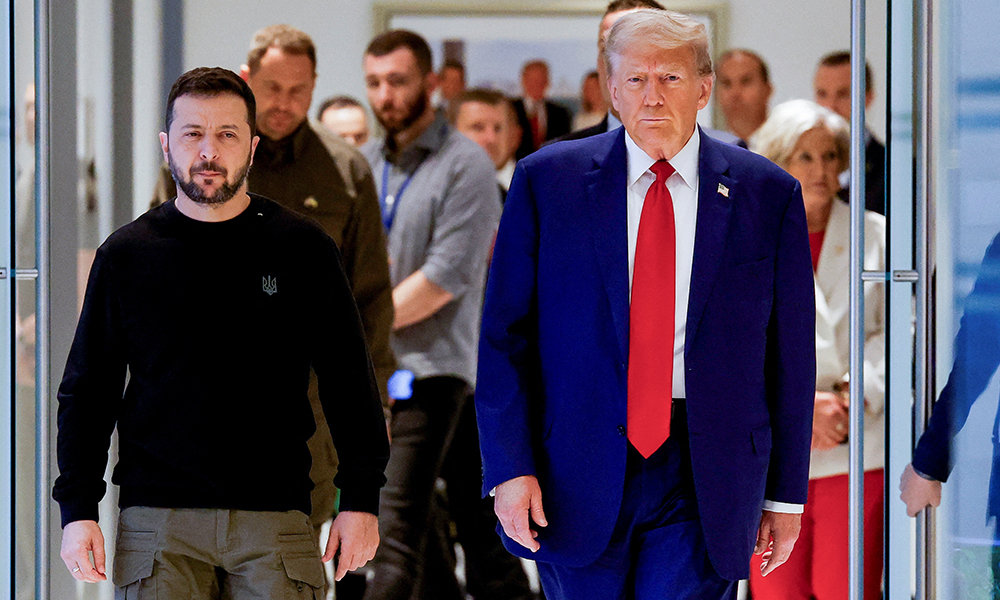
U.S. President Donald Trump and Ukrainian President Volodymyr Zelenskiy agreed on Wednesday to work together to end Russia’s war with Ukraine, in what the White House described as a “fantastic” one-hour phone call.
In their first conversation since an Oval Office shouting match on February 28, Zelenskiy thanked Trump for U.S. support and the two leaders agreed that technical teams would meet in Saudi Arabia in the coming days.
Zelenskiy asked Trump for more air defence support to protect his country against Russian attacks and the U.S. president said he would help locate the necessary military equipment in Europe, the White House said.
Trump briefed Zelenskiy on his phone call on Tuesday with Vladimir Putin, in which the Russian president rejected a proposed full 30-day ceasefire sought by Trump that Ukraine said it would be prepared to accept, but agreed to pause attacks on energy infrastructure.
That narrowly defined pause appeared in doubt on Wednesday, however, with Moscow saying Ukraine hit an oil depot in southern Russia while Kyiv said Russia had struck hospitals and homes, and knocked out power to some railways.
Still, the two sides carried out a prisoner exchange, each releasing 175 troops in a deal facilitated by the United Arab Emirates. Moscow said it freed an additional 22 wounded Ukrainians as a goodwill gesture.
Zelenskiy, describing his conversation with Trump as “positive, very substantive and frank,” said he had confirmed Kyiv’s readiness to halt strikes on Russian infrastructure and to accept an unconditional frontline ceasefire as the U.S. proposed earlier.
“One of the first steps toward fully ending the war could be ending strikes on energy and other civilian infrastructure. I supported this step, and Ukraine confirmed that we are ready to implement it,” he said on social media.
Later, the Ukrainian president told reporters in a video call that Trump understands Kyiv will not recognize occupied land as Russian.
Zelenskiy said the Russian strikes, which he said were carried out since Trump’s call with Putin, showed that Russia was not ready for peace. He said the U.S. should be in charge of monitoring any ceasefire, adding a halt to infrastructure attacks could be quickly established.
The Kremlin said it had called off planned attacks on Ukraine’s energy infrastructure, including by shooting down seven of Russia’s own drones heading towards Ukraine. It accused Kyiv of failing to call off its own attacks in what it called an attempt to sabotage the agreement.
Trump suggested to Zelenskiy the U.S. could help run, and possibly own, Ukraine’s nuclear power plants, according to a statement by the U.S. administration. Europe’s largest nuclear power plant, in Ukraine’s Zaporizhzhia region, has been shut down since Russian troops occupied it in 2022.
Zelenskiy said Ukraine has begun talks with the U.S. about its possible involvement in restoring the Zaporizhzhia plant.
Trump has long promised to end Europe’s deadliest conflict since World War Two. But his outreach to Putin has unnerved European allies, who fear it heralds a fundamental shift after 80 years in which defending Europe from Russian expansionism was the core mission of U.S. foreign policy.
Some European leaders said Putin’s rejection of Trump’s proposed full truce was proof Moscow was not seeking peace. The offer to temporarily stop attacking Ukrainian energy facilities counted for “nothing” and Trump would have to win greater concessions, Germany’s defence minister said.
“Putin is playing a game here and I’m sure that the American president won’t be able to sit and watch for much longer,” Boris Pistorius told German broadcaster ZDF.
The EU’s foreign policy chief Kaja Kallas said she would present a proposal to European leaders in Brussels on Thursday to provide Ukraine with 2 million rounds of large-calibre artillery ammunition, according to a letter seen by Reuters.
For most of the past three years, Russia has relentlessly attacked Ukraine’s power grid, arguing that civilian infrastructure is a legitimate target because it facilitates Kyiv’s fighting capabilities. Ukrainians say such attacks have subsided in recent months.
Kyiv has steadily developed capabilities to mount long-range attacks into Russia, frequently using drones to target distant oil and gas sites, which it says provide fuel for Russia’s troops and income to fund the war.
In the attacks overnight, Ukrainian regional authorities said Russian drones damaged two hospitals in the northeastern Sumy region, causing no injuries but forcing the evacuation of patients and staff.
Near Kyiv, a 60-year-old man was injured and airstrikes hit homes and businesses in the Bucha district north of the capital. Attacks damaged power systems for railways in Dnipropetrovsk in the south on Wednesday, the state railway said.
Authorities in the southern Russian region of Krasnodar said a Ukrainian drone attack caused a fire at an oil depot near the village of Kavkazskaya. No one was injured.
The depot is a rail terminal for Russian oil supplies to a pipeline linking Kazakhstan to the Black Sea. A representative of the Caspian Pipeline Consortium operator said oil flows were stable. Two industry sources said the attack could reduce Russian supplies to the pipeline.
World
Putin agrees to 30-day halt on energy facility strikes in Ukraine
The Kremlin said the conversation between Putin and Trump had been a “detailed and frank exchange of views.”
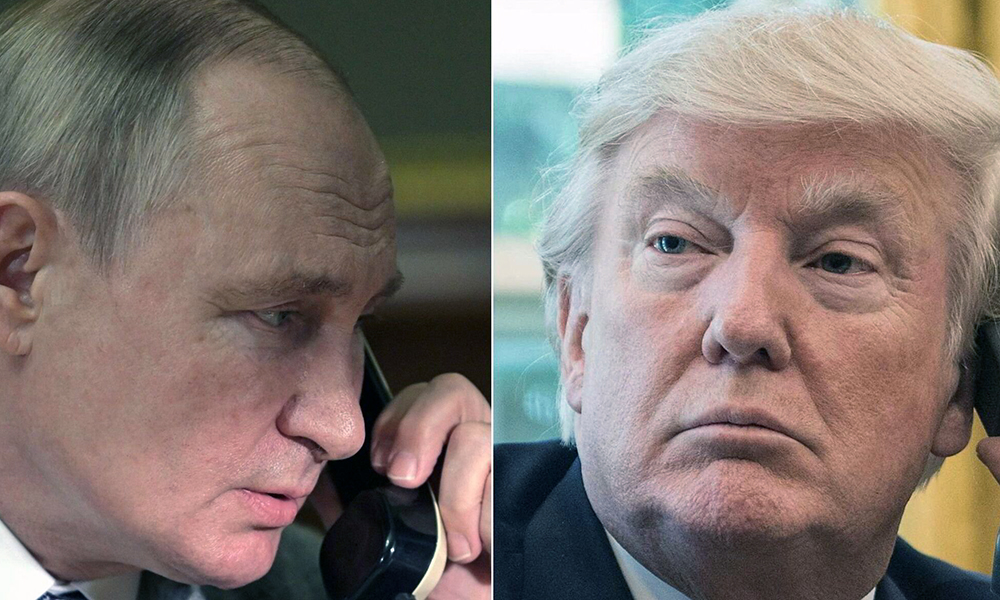
Russian President Vladimir Putin agreed to a proposal by U.S. President Donald Trump for Russia and Ukraine to stop attacks on each other’s energy infrastructure for 30 days and ordered the Russian military to cease them, the Kremlin said on Tuesday.
Russia has pounded Ukrainian energy installations and its electricity grid throughout the war, and Kyiv has responded with damaging strikes on refineries and fuel depots.
If implemented, Tuesday’s agreement would represent a genuine de-escalation in the three-year war. The Kremlin made no mention of Ukraine’s specific stance on the temporary halt in the targeting of energy infrastructure, but said Trump’s proposal had spoken of “a mutual refusal.”
The agreement fell short however of a wider agreement that the U.S. had sought, and which was accepted by Ukraine, for a blanket 30-day truce in the war.
“During the conversation, Donald Trump put forward a proposal for the parties to the conflict to mutually refrain from striking energy infrastructure facilities for 30 days. Vladimir Putin responded positively to this initiative and immediately gave the Russian military the corresponding command,” the Kremlin said in a statement.
On the proposed wider truce Putin reiterated concerns that he had raised last week, according to the Kremlin’s readout.
“The Russian side outlined a number of significant points regarding ensuring effective control over a possible ceasefire along the entire line of combat contact, the need to stop forced mobilisation in Ukraine, and the rearming of the Ukrainian Armed Forces,” it said.
Putin also said that the key condition for resolving the conflict diplomatically should be “the complete cessation of foreign military assistance and provision of intelligence information to Kyiv”, the Kremlin added.
It said Putin had questioned Ukraine’s willingness to negotiate in good faith, and had accused it of carrying out “barbaric terrorist crimes” during a seven-month incursion into Russia’s western Kursk region.
Ukraine denies such atrocities, and similarly questions Russia’s trustworthiness and whether Moscow would respect any deal.
The Kremlin said the conversation between Putin and Trump had been a “detailed and frank exchange of views.”
It said Putin had underlined that a resolution of the conflict must be “comprehensive, sustainable and long-term” and take into account Russia’s own security interests and the root causes of the war.
Putin, it said, had also “responded constructively” to a Trump initiative on protecting shipping in the Black Sea and the two sides agreed to begin negotiations.
The Kremlin said that Russia and Ukraine would conduct another prisoner exchange on Wednesday, trading 175 people from each side.
Putin has said he wants Ukraine to drop its ambitions to join NATO, Russia to control the entirety of the four Ukrainian regions it has claimed as its own, and the size of the Ukrainian army to be limited.
He has also made clear he wants Western sanctions eased and a presidential election to be held in Ukraine, which Kyiv says is premature while martial law is in force.
-
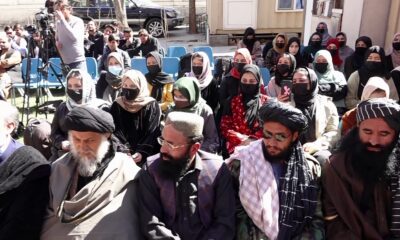
 Latest News5 days ago
Latest News5 days agoNational Journalists Day sparks reaction from Afghanistan’s media workers
-

 World3 days ago
World3 days agoPutin agrees to 30-day halt on energy facility strikes in Ukraine
-

 Sport4 days ago
Sport4 days agoIPL 2025 celebrates 18 years of immense success
-
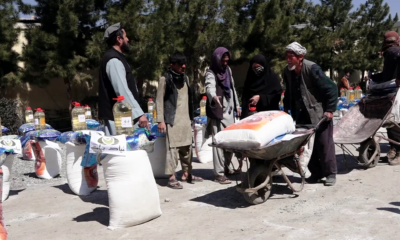
 Latest News4 days ago
Latest News4 days agoBayat Foundation helps needy families in Kabul during Ramadan
-

 Latest News3 days ago
Latest News3 days agoTorkham crossing to reopen after 25-day shutdown
-

 Latest News4 days ago
Latest News4 days agoAfghan-Pakistan talks to reopen Torkham border ‘end on positive note’
-
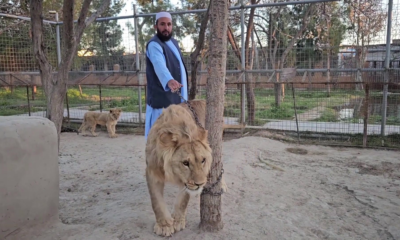
 Latest News3 days ago
Latest News3 days agoHelmand environmental department opens new Zoo
-
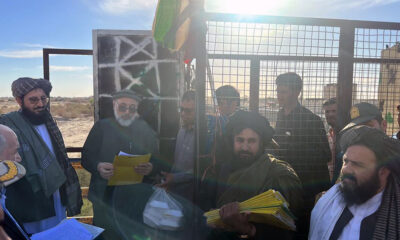
 Latest News2 days ago
Latest News2 days agoAfghan prisoners in Iran sent home








